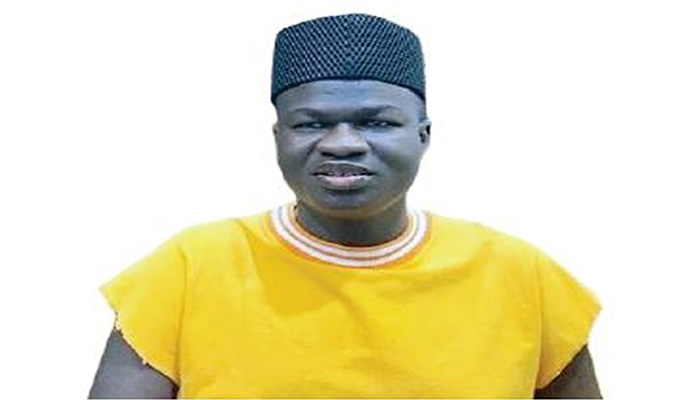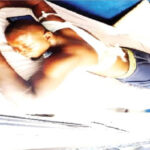
A 23-year-old visually impaired podcaster, Abenego Oghene, tells TEMITOPE ADETUNJI about his talent, passion for podcasting and how he has been able to attain his present status despite his disability
When and how did you lose your sight?
I lost my sight three months after birth; I use to tell people that they didn’t even allow me to enjoy my subscription before they took it.
What did your parents tell you really happened?
Medically, the doctor said that I had a cataract attachment.
Did the doctor recommend any solution?
The doctor I met back then, Dr Hassan, gave us a refund of our money and told my parents that we should go home and leave my eyes to God.
With your disability, did you have a normal childhood experience?
Yes, I did. In fact, my childhood experience was beautiful; I was one of those kids that played, even with disabilities. I rolled tyres and did normal things kids do. I used to run errands for my family. I did a lot of stuff as a child. On a scale of 1/10, I rate my childhood 10, my childhood was beautiful.
What kind of support did your parents and siblings give to you?
My parents were very supportive, Even though it was tiring for my father, he was supportive and my mother was very supportive. She was always trying to get solutions and made me go to church. My parents gave me the opportunity and the support needed. Till today, my mother will always reach out to me to tell me I am a great child, a fantastic person, encouraging me to do anything I want to do. I am the last and the most special of five children.
My siblings are supportive any day and any time. My elder brother helps me with the editing and production of my work at no cost. Also, my eldest brother is always showing his support and my elder sisters are always coming to show me support. They always tell me that I am that special one; I am that guy who has conquered things.
What schools did you attend?
Yes, I attended the Pacelli School for the Blind and Partially Sighted Children’s School. They don’t pay school fees. It is located in Surulere, Lagos. I spent seven years in the school. I also attended King’s College for my secondary school. This coming September, I will be resuming as a student at the University of Lagos to study History and Strategic Studies.
Can you speak about your educational experience?
The finest educational experience was in the partially blind school. They groomed me well and nurtured me. They made me understand that I am talented and there was a time I didn’t want to leave there. I went to King’s College, and they also tried to help me grow. My best experience was in the school for the partially blind.
What forms of discrimination did you face?
I remembered a time people were thinking that communicating was hard for me. I made friends that we still communicate with and keep in touch with up till now. The issue is that sometimes, you try to show people your talent and they are not sure to give you the work. I rap as well, I don’t want people to listen to me with pity but criticise the work. Also when I walk into radio stations to get jobs, they will say I am not done with school. There are also the challenges of a relationship; finding a partner. The other person is scared so as not to be seen as a liability to people and the education sector is not focusing on us (people with impaired vision) as much as they should. However, people have survived and we will survive too.
Are you currently in a relationship?
I am not currently in a relationship; I have tried going into a relationship between 2017 and 2019 but in the long run, the lady pulled out because I am visually impaired.
How do you manage to communicate with people comfortably?
Technology has made things easy, I handle my Instagram myself, Twitter, Facebook and other social media platforms. I do a large percentage of my things myself. With the help of the screen reader, there is also an app on the iPhone called Voiceover and on the Android; they call them talkback. It has been helping me to read and communicate with people. When I want to read, I do it on my laptop. There is something called NVDA; that’s what helps me to know what I am reading and calculate time. There are many apps that help visually impaired people to read through the help of technology. My screen reader allows me to do my reading perfectly.
How did you get into podcasting?
I got into podcasting during the COVID-19 pandemic; a lot of things were happening and I ended the six-month contract I had with an organisation where I worked as a presenter. It was an online radio and it was a six-month deal and knowing full well that the contract had ended, I didn’t go back and wasn’t called back.
The pandemic sets in and there was boredom and I decided to try something new. So, I spoke to a friend, Favour Adediran, and I asked about the requirements for being a podcaster. She encouraged me to start podcasting and showed me an app to use. I went into podcasting just to have fun. Then I started to like it. I did for a while, then I transitioned into a clubhouse, posting Reality and Life Lounge (RALL). I did it for a while, then moved to Twitter space where I host a show called ‘Sundays with Abdnego’.
I am hoping that by September, I will start a podcast where people can tune in to their favourite podcasting apps and on YouTube, once everything is right and God willing, everything will go well as planned.
Where do you see yourself in five years?
I am hoping that my podcasts will be huge by then and possibly, I am not just going to be a voice actor known only in Nigeria but will be known globally. I will be the guy you want to host your events, listen to his podcast and want to host on your programme. I want to be the guys’ guy.
What advice do you have for people with disabilities and how to approach things in life?
Never stop going for what you want, and never settle for less because when you do that, what happens is that your potential is set back. For those whose parents are not letting them go out, they should allow them to go out and show their talents. They have a lot to achieve. To those who are still struggling to succeed, you should continue to do so and don’t be discouraged. We should also get to that stage to lift others up.
What kind of support do you need now?
I want people to give me jobs on voiceovers to host their events and also a scholarship as I want to resume going to school this September so that I can make my voice come alive. It will also make a lot of sense because I believe that if I grow with this disability, it will inspire my other friends and make them believe they can do more.





